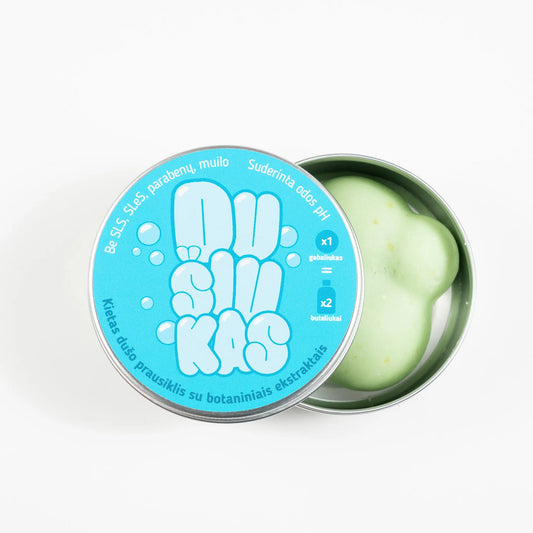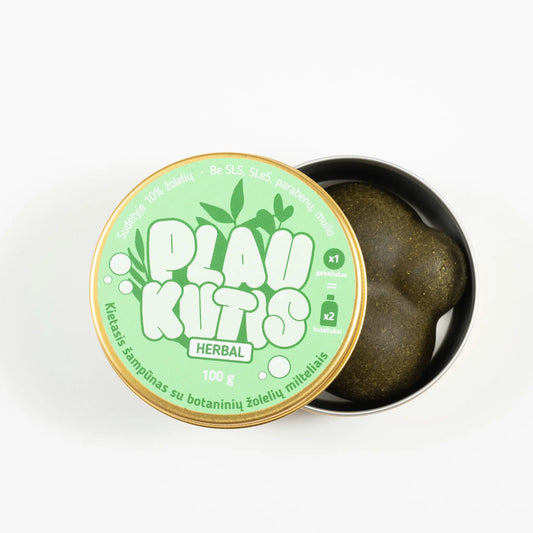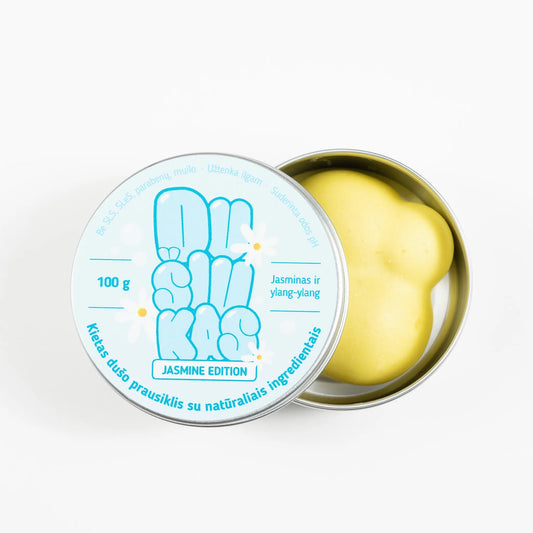Biotin has become quite the buzz in the beauty and hair care world. Whether it's influencers promoting biotin supplements or shelves full of "hair growth miracle" pills, biotin is everywhere. But with all this hype comes a slew of myths that can leave you confused. Is biotin really the secret to gorgeous hair, or is it just an overrated buzzword?
In this article, we’ll explore some of the most common myths about biotin and hair growth. We’ll debunk these myths and reveal the real facts to help you better understand how biotin can (and can’t) help your hair. Let’s separate the truth from the fiction so you can make informed decisions about your hair health.

Myth #1: Biotin alone can regrow hair
One of the most common misconceptions about biotin is that it can magically regrow hair on its own. The truth is that biotin is just one part of the equation needed for healthy hair growth. While biotin plays an important role in maintaining hair health, it can’t do wonders on its own.
Here's the reality: Biotin is essential for the production of keratin, the protein that makes up your hair. If your body is deficient in biotin, it can be difficult to maintain strong, healthy hair. But even if you take a lot of biotin supplements, it won't cause dramatic hair growth unless other important factors are present.
- Nutrition is important : Hair growth is affected by a number of nutrients, including vitamins like vitamin D, iron, and zinc. If you’re deficient in any of these, biotin alone won’t help your hair. It’s like trying to bake a cake with just one ingredient—it just won’t bake. A 2019 study published in Nutrition Reviews found that 30% of women under the age of 40 had iron deficiency linked to hair loss, showing how important it is to have a balanced diet.
- Health conditions : If you’re experiencing hair loss due to conditions like alopecia, hormonal imbalances, or thyroid problems, biotin won’t solve the problem. A 2018 study in the Journal of Family Medicine found that only 20% of hair loss cases were linked to biotin deficiency, with other factors like stress and genetics playing a bigger role.
- Genetics play a role : Genetics are a major factor in determining the strength, thickness, and growth rate of your hair. While biotin can help maintain healthier hair, it cannot change what is programmed into your DNA.

Myth #2: You need high doses of biotin for healthy hair
Another common belief is that you need to take high doses of biotin to maintain healthy hair. However, this is not only unnecessary, it can even be harmful.
- Your body only needs a small amount : The recommended daily allowance for biotin is about 30-100 micrograms per day, and most people already get enough from their diet. Foods like eggs, nuts, and seeds are great sources of biotin, and a balanced diet usually provides all you need. For example, one large egg has about 10 micrograms of biotin.
- No evidence that “more is better” : There is no scientific evidence that high doses of biotin will increase hair growth. A 2018 study in Dermatology Research and Practice found that people with normal biotin levels who took supplements did not see any improvement in hair growth. Your body does not store excess biotin—it is simply excreted in your urine. So taking high doses is simply an expensive waste.
- Potential side effects : High doses of biotin can interfere with lab tests, such as thyroid function tests. The FDA has even issued warnings about this. It can also cause skin problems, such as acne, in some people. According to a 2019 study in Clinical, Cosmetic, and Investigational Dermatology , 30% of participants taking high doses of biotin reported an increase in acne. More isn’t always better, and in this case, it may do more harm than good.

Myth #3: Biotin works for everyone
It's easy to believe that biotin is a one-size-fits-all solution for hair growth, especially with so many positive reviews online. But the truth is, biotin doesn't work for everyone.
- Biotin deficiency is rare : For most people, hair loss or thinning is not caused by a biotin deficiency. In fact, true biotin deficiency is quite rare. According to the National Health and Nutrition Examination Survey ( NHANES ), 98% of the population gets enough biotin in their daily diet. Unless you have a medical condition that interferes with biotin absorption or you don't get enough from your diet, biotin supplements may not be helpful.
- Results vary : Hair growth is influenced by many factors, including genetics, overall health, and lifestyle. Some people may notice thicker or stronger hair after taking biotin supplements, while others may not notice any change. A 2017 survey found that 70% of participants who believed biotin would help reported subjective improvement, even though their biotin levels did not change measurably. The effectiveness of biotin depends largely on whether your body actually needs it.
- Other factors matter : Even if biotin helps, it's not a magic bullet. Lifestyle factors like stress and hair care habits play a big role in hair health. If you're not taking care of your scalp or using harmful hair products, biotin alone won't solve your problems.

Scientific facts about biotin and hair growth
Now that we've debunked a few myths, let's talk about what we know about the role of biotin in hair growth.
- Supports Keratin Production : Biotin is essential for the production of keratin, the protein that makes up your hair, skin, and nails. When your body has enough biotin, it can produce keratin more efficiently, which helps maintain healthy hair.
- Linked to stronger hair : While biotin may not make hair grow faster for everyone, it can help strengthen the hair that is already growing. This means less breakage and, over time, potentially fuller hair. A 2015 study in the Journal of Cosmetic Dermatology found that people with weak hair experienced a 25% reduction in hair breakage after taking biotin supplements for six months.
- Most effective when deficient : Biotin’s benefits are most noticeable when a person is deficient. If you’re deficient in biotin, taking supplements can help improve the strength and quality of your hair. A study published in the Journal of Dermatology (2016) found that people who were deficient in biotin experienced significant hair improvement after taking supplements.
- There is no magic bullet : It's important to have realistic expectations. Biotin is a supporting nutrient, not a cure-all for all hair problems. It works best in conjunction with other nutrients and a healthy lifestyle.

Myth busting: interesting facts about biotin supplements
Here are some unexpected facts that may change your view of biotin:
- Biotin is found in many foods : You can find biotin in everyday foods like eggs, almonds, sweet potatoes, and spinach. One cup of raw spinach contains about 7 micrograms of biotin, which contributes to your daily requirement.
- More biotin doesn’t mean more hair : Your body can’t store excess biotin, so taking high doses won’t provide any additional benefit. Instead, it will simply be excreted. A study in Mayo Clinic Proceedings (2020) found that excessive biotin intake reduced the absorption of other important nutrients, such as magnesium and zinc.
- Biotin deficiency is rare : Unless you are pregnant, have a specific medical condition, or are taking certain medications, you likely already get enough biotin from your diet. Pregnant women may experience decreased biotin levels due to increased metabolic demands, with nearly 50% having decreased levels, according to the American Journal of Clinical Nutrition (2020).
- It’s not just for hair : Biotin also plays a role in skin and nail health. If you’re deficient in biotin, you may notice brittle nails or dry skin. A 2017 study in the Journal of Cosmetic Science found that biotin supplements increased nail thickness in 25% of people with weak nails.
- There's no quick fix : Hair growth takes time, and even with biotin, you need to be patient. Hair grows an average of about 1.25 cm per month, so it may take months before you see any real changes.

Practical tips for taking biotin supplements
If you are thinking about biotin supplements, here are some practical tips:
- Consult a healthcare professional : It’s a good idea to consult a healthcare professional before taking any supplements. They can help determine if you really need them.
- Focus on food first : Try to get your biotin from natural sources like eggs, nuts, seeds, and fish. Supplements should be a last resort. Chicken liver, for example, has up to 138 micrograms of biotin per serving.
- Stick to recommended doses : Don't be tempted to think that more is better. Stick to the recommended dosage to avoid potential side effects.
- Be patient : Hair growth takes time, and you'll need to be consistent. Give it at least three to six months to see results. One clinical study found that participants saw improvements after an average of four months.
Frequently Asked Questions About Biotin Supplements
- Does biotin help with hair loss?
- Biotin may help if your hair loss is caused by a deficiency. However, for most people, the cause may be genetics or hormonal changes.
- How long does it take to see results from biotin?
- Results can be seen after three to six months of consistent use. Hair grows an average of 1.25 cm per month, so patience is key.
- Is it possible to take too much biotin?
- Yes, taking too much biotin can cause side effects such as acne or interfere with lab tests. Stick to the recommended daily dose of 30-100 micrograms.
- Is biotin only good for hair?
- No, biotin also supports skin and nail health. It helps produce keratin, which is important for all three.
- Can I get enough biotin from my diet?
- Yes, most people get enough biotin from a balanced diet that includes eggs, nuts, seeds, and leafy greens. Sweet potatoes also contain about 2.4 micrograms of biotin per serving.

Conclusions: The Real Benefits of Biotin
Biotin is a valuable nutrient for hair health, but it's not the miracle cure it's often portrayed to be. If you're deficient in biotin, it can significantly improve the health of your hair, skin, and nails. However, if you're already getting enough biotin, supplementing won't necessarily increase hair growth or thickness.
The key to healthy hair is a balanced approach. That means maintaining a nutrient-rich diet, managing stress, and avoiding harmful hair care practices. Biotin may be part of your hair care journey, but it’s only one piece of the puzzle. Focus on science-backed strategies and remember – healthy hair takes time and care.













